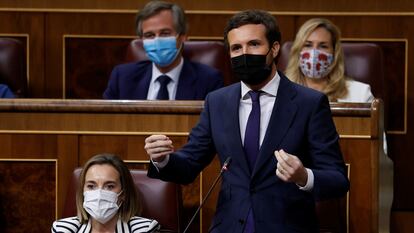Jailed Catalan separatists are released from prison following pardons
The decision to commute the sentences of the nine individuals has been met with fierce opposition, with the Popular Party calling on Prime Minister Pedro Sánchez to resign

Nine Catalan separatists jailed for their involvement in the failed 2017 secession attempt in Catalonia were released from prison on Wednesday after being granted pardons by the Spanish government.
Spanish Prime Minister Pedro Sánchez announced the pardons on Tuesday, arguing the decision was an effort to restore “social harmony” in the region after years of tension. The Socialist Party (PSOE) chief explained that the pardons did not question the Supreme Court ruling against the nine individuals – who were found guilty of sedition and misuse of public funds and sentenced to between nine and 13 years in prison – but were instead aimed at opening “a new era of dialogue and reuniting, closing off the confrontation once and for all. Spanish democracy is today showing its greatness.”
The pardons were published on Wednesday in the Official State Bulletin (BOE) with the signatures of Spain’s King Felipe VI and Justice Minister Juan Carlos Campo. They apply to Oriol Junqueras, the leader of the Catalan Republican Left (ERC) and deputy premier during the secession attempt; former regional ministers Raül Romeva, Jordi Turull, Josep Rull, Joaquim Forn and Dolors Bassa; former Catalan parliament speaker Carme Forcadell, and two civil society leaders, Jordi Sànchez and Jordi Cuixart, whose organizations actively participated in the breakaway attempt.

The six men were released from Lledoners prison in Barcelona, while Bassa left Puig de les Basses prison in Figueres and Forcadell left the Wad-Ras penitentiary in Barcelona. Some of the prisoners had been behind bars for three-and-a-half years, including their time in pre-trial custody.
Supporters of the politicians and civic leaders gathered outside their respective prisons to celebrate their release. Outside the Lledoners penitentiary, six of the released leaders posed with a banner reading “Freedom for Catalonia” – the same sign that was used by pro-Catalan independence activists at the 1992 Olympic Games in Barcelona – and promised to continue to fight for the independence of Catalonia.
“Prison has not divided us, it has strengthened our convictions,” said Junqueras, who was deputy premier when Catalonia held an outlawed independence referendum on October 1, 2017. That was followed by an independence declaration passed by separatist parties inside the regional parliament.
The pardons granted to the nine leaders were partial and only commuted the prison sentences. The nine figures will still be barred from public office, and the pardons will stand provided the recipients do not commit another serious offense – conditions that were criticized by the separatist leaders.
“They have given us a conditional, reversible and partial pardon. Well they should listen hard: our commitment to finish what we started on October 1 [the date of illegal independence referendum] is not conditional, nor reversible, nor partial,” said Turull.
Opposition

The Spanish government’s decision to approve the pardons for the separatist leaders has been met with fierce criticism by opposition parties, who claim the move is politically motivated.
The rhetoric intensified on Wednesday with Pablo Casado, the leader of the conservative Popular Party (PP), calling on Sánchez to step down and call early elections.
“You must resign today and put your decision to the judgment of the Spanish people, because you have tricked them,” he told Sánchez at a question-and.answer session in the Congress of Deputies.
The PP leader accused the prime minister of “betraying his oath to defend national unity,” and said he would appeal the pardons at the Supreme Court.
Sánchez is scheduled to receive Catalan premier Pere Aragonès at La Moncloa presidential palace, the official seat of government, on Tuesday.
With reporting by Xosé Hermida.
English version by Melissa Kitson.
Tu suscripción se está usando en otro dispositivo
¿Quieres añadir otro usuario a tu suscripción?
Si continúas leyendo en este dispositivo, no se podrá leer en el otro.
FlechaTu suscripción se está usando en otro dispositivo y solo puedes acceder a EL PAÍS desde un dispositivo a la vez.
Si quieres compartir tu cuenta, cambia tu suscripción a la modalidad Premium, así podrás añadir otro usuario. Cada uno accederá con su propia cuenta de email, lo que os permitirá personalizar vuestra experiencia en EL PAÍS.
¿Tienes una suscripción de empresa? Accede aquí para contratar más cuentas.
En el caso de no saber quién está usando tu cuenta, te recomendamos cambiar tu contraseña aquí.
Si decides continuar compartiendo tu cuenta, este mensaje se mostrará en tu dispositivo y en el de la otra persona que está usando tu cuenta de forma indefinida, afectando a tu experiencia de lectura. Puedes consultar aquí los términos y condiciones de la suscripción digital.








































